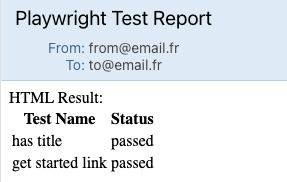Playwright + email = reporter
 Vitali Haradkou
Vitali Haradkou
Recently, I received a request from one of the project leads about integrating Playwright with Email. Since the email report was generated by a playwright written using React. That means we cannot send the same HTML report due to the interactive behaviour of the built-in HTML reporter.
Requirements
Select when the report should be sent
Subjectandbodyshould be written in code.Support many email services out of the box
Nice to have:
- Generate an ICS meeting in case of a failed test due to the scheduled run.
So I started to investigate the solution and found that existing reports do not cover our needs. That starting point - time to tinkering!

How do I see myself when solving problems and tinkering
First of all, I take nodemailer as a dependency to send an email and check it.
After all, I was trying to add interfaces. Inspect the playwright built-in HTML reporter about settings and env variables. As for initial implementation, I was taking only the send setting with the same args: never, always and on-failure. Other settings like from, to, service reuse from nodemailer dependency and add env var support with predefined values like send (send default value is on-failure).
So let's check out how it works.
Step 1. Installation
just add dependency playwright-nodemailer-reporter via any package manager:
npm i playwright-nodemailer-reporter # for npm
pnpm i playwright-nodemailer-reporter # for pnpm
yarn add playwright-nodemailer-reporter # for yarn
Step 2. playwright config
At this step, we have to add a reporter for Playwright. You can do it in the playwright.config.ts file
// filename: playwright.config.ts
import { defineConfig } from "@playwright/test";
import { type EmailReporterOptions } from "playwright-nodemailer-reporter";
export default defineConfig({
reporter: [
[
"playwright-email-reporter",
{
send: 'always',
from: "your-email@example.com",
to: "recipient-email@example.com",
subject: "Playwright Test Report",
html: "<p>Test report</p>", # what will be send
} satisfies EmailReporterOptions,
],
],
});
Step 3. Dynamic message
The next step was to make the message and subject dynamically generated. This is essential for the customer because we save a ton of time with building up the string. Moreover, subject, html and text keys support async function to call any of your external functions or async functions.
import { defineConfig } from "@playwright/test";
import { type EmailReporterOptions } from "playwright-email-reporter";
export default defineConfig({
reporter: [
[
"playwright-email-reporter",
{
send: "always",
service: "Maildev",
port: 1025,
from: "from@email.fr",
to: "to@email.fr",
subject: "Playwright Test Report",
html: (result, testCases) => {
return `
HTML Result:
<table>
<tr>
<th>Test Name</th>
<th>Status</th>
</tr>
${testCases
.map(
([testCase, result]) => `
<tr>
<td>${testCase.title}</td>
<td>${result.status}</td>
</tr>
`,
)
.join("")}
</table>
`;
},
} satisfies EmailReporterOptions,
],
],
});
In this example, we build a table with the test case name and its result.
The rendered result will be something like this:

You can also add Gmail or other popular services since the reporter just reused nodemailer.
Step 4. You are awesome!
Check it out on npm: https://www.npmjs.com/package/playwright-nodemailer-reporter Check it out on GitHub: https://github.com/vitalics/playwright-nodemailer-reporter
P.S. I was faced with an issue when playwright-email-reporter and playwright-mail-reporter already existed, so I renamed the package, but the naming can be inconsistent with the package name. I'll try to fix it in the next release.
P.P.S. Check the other cool packages for everyday usage
rslike. Rust-like safe approach for JS/TS code
Thanks for the reading and have a good time! Made with ❤️ from Vitali!
Subscribe to my newsletter
Read articles from Vitali Haradkou directly inside your inbox. Subscribe to the newsletter, and don't miss out.
Written by

Vitali Haradkou
Vitali Haradkou
SDET. Certified Node.js Application Developer(JSNAD)